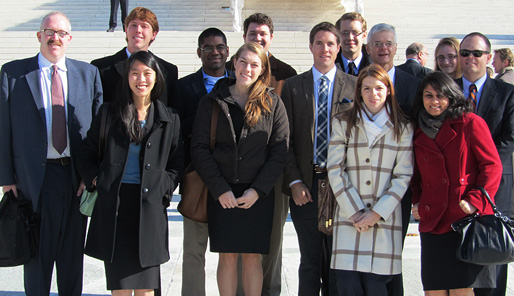The U.S. Supreme Court agreed on Tuesday to hear the case of a Texas man who is appealing his 2010 federal firearms conviction and who is being represented by the Supreme Court Litigation Clinic at the University of Virginia School of Law.
Justus Cornelius Rosemond, the clinic’s client, was convicted of discharging a firearm, or aiding and abetting the discharge of a firearm, during and in relation to a federal drug trafficking crime in Utah.
At trial, Rosemond was found guilty and sentenced to 14 years under two alternative theories – that he fired a handgun when the drug deal went bad, or that his cohort fired the gun but that he was liable because he was aiding and abetting the shooting.
Supreme Court Litigation Clinic Director Dan Ortiz said there is sharp disagreement among the nation’s circuit courts over what is necessary to convict someone under the aiding and abetting law.
In the case, Rosemond v. United States, Ortiz said, the justices will consider “whether to convict [a defendant] for aiding and abetting someone else under the federal gun statute – which criminalizes the use of a firearm during and in relation to a crime of violence or drug crime – the government has to show only that the would-be aider-and-abettor knew that a gun was used in the overall crime in which he participated or whether he had to intentionally facilitate or encourage the use of the firearm.”
In eight federal circuit courts, a defendant cannot be convicted of aiding and abetting a confederate’s use of a gun unless the defendant facilitated or encouraged the use of the firearm.
In three circuits – including the 10th U.S. Circuit Court of Appeals, where Rosemond’s case was previously heard – a conviction under that law requires only the knowledge that the principal used a firearm during a crime of violence or drug trafficking crime in which the defendant also participated.
“Under these minority jurisdictions, [a defendant] can be held liable for possessing and using that gun as a matter of fact because aiders-and-abettors are liable as the principal, and they’re held just as responsible as the person who uses the gun,” said John Elwood, a clinic instructor and partner at the Vinson & Elkins law firm.
“They could know nothing about a gun until it’s fired,” he added. “But because they don’t withdraw from the drug conspiracy, they could be held liable for discharging a gun, which is a pretty serious offense.”
Elwood will argue the case before the Supreme Court, most likely in December. He said the justices should side with the majority of circuit courts in interpreting the statute.
Under the minority circuits’ interpretation, the aiding-and-abetting charge subjects defendants to an “enormous sentence enhancement even if he did not intend his confederate to use the firearm and did nothing to facilitate or encourage it – indeed, even if the defendant discouraged or sought to prevent its use,” according to the clinic’s petition for a writ of certiorari.
The split between the circuit courts has led to significant disparities in sentencing and standards of proof, according to the petition.
“[I]f the drug transaction here had occurred near petitioner’s home in Texas instead of the buyers’ residence in Utah, a different rule would have governed,” the petition said. “The conflict gives rise to disparities in punishment that are quite substantial. Petitioner’s firearms conviction accounts for the vast majority of his sentence – 120 of 168 months, or 71 percent.”
Elwood said it is an “everyday occurrence” for the government to charge defendants with aiding and abetting.
Between 2008 and 2011, he said, more than 2,300 defendants were charged with violations of that statute each year, making it one of the most common offenses carrying a mandatory minimum sentence.
“It does happen all the time,” he said. “I think that probably figured prominently in the court’s decision to grant.”
A number of U.Va. law students who graduated earlier this month were involved in preparing the opening petition in the case. Clinic student Scott Gallisdorfer found the case and brought it to the clinic’s attention. And Ryan Mowery, Archith Ramkumar, Levi Swank, David Parker, Galen Bascom and Jonathan Urick all contributed to preparing the petition.
“I am thrilled the court granted cert,” Urick said. “It’s quite fulfilling to know that our work with the clinic is making a difference. Rosemond is a particularly fascinating case. It raises some great questions of criminal law and statutory interpretation.”
Ortiz said that Rosemond was a good case for the clinic because its central question is a “practically and theoretically interesting and important one, the federal courts of appeals had taken different positions on it, and it was an issue that would engage the students pedagogically.”
Next year’s clinic students will likely work on the merits reply in the case early in the fall semester, Ortiz said.
Rosemond is the latest in a string of Supreme Court Litigation Clinic cases to be heard by the Supreme Court in recent years. The clinic is currently waiting on the court’s opinion in Vance v. Ball State University, a workplace harassment case that Ortiz argued in November.
Media Contact
Article Information
May 29, 2013
/content/supreme-court-hear-federal-gun-law-case-uva-law-school-clinic

